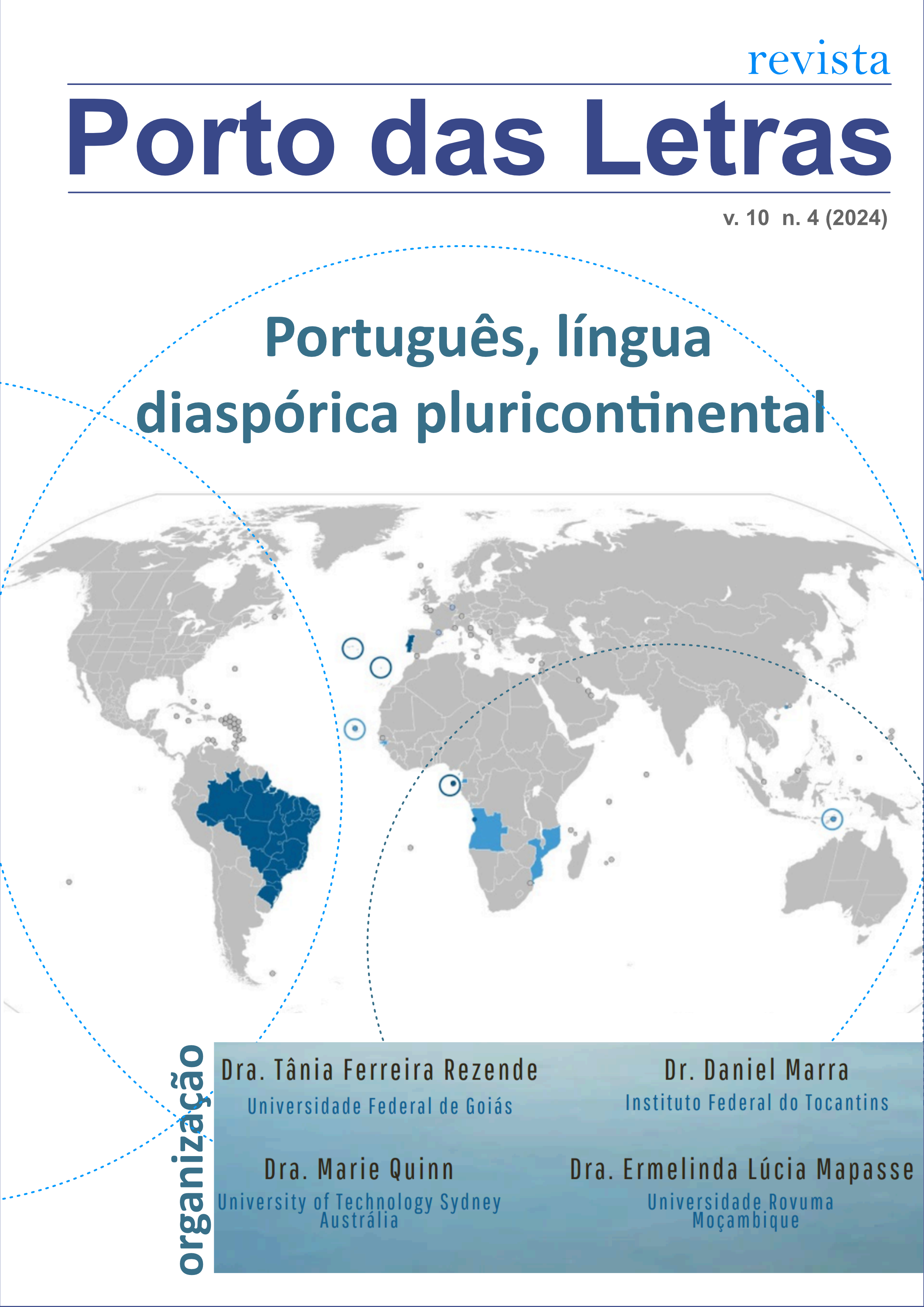O RIO, COMO A GENTE, É MAIS IMPORTANTE NA FOZ DO QUE NA SUA NASCENTE: DESIGNAÇÕES PARA RIO PEQUENO E SEU ENTORNO SEMÂNTICO
DOI:
https://doi.org/10.20873.24.3011Abstract
This article presents an analysis of lexical units that designate the empirical reality small river and its semantic environments based on data generated by the project Linguistic Atlas of Goiás (MILANI et al., 2015), focusing on the diatopy of the north and northeast regions of Goiás, Brazil. Besides the ways of naming this object from the empirical world, will be considered for the analysis lexical units that name the place where it originates, the encounter with another river and the movements of its water. Such lexical units are analyzed based on their metalexicographic meanings and also on the meanings expressed by the speaker’s. Above all, it focuses on the lexical-semantic creation process, using, whenever possible, its etymons and past synchronies, but also on the process of semantic change that involves such words in the current synchrony. Regarding the diverse possibilities of designating the semantic environments of the empirical reality of small river, this article also uses the notion of categorization and the theory of prototypes that may shed light on the following questions: (i) How can an object in the empirical world gather around itself so many linguistic forms related to the same meaning?, and (ii) How do these different forms and meanings related to the same referent not interfere in the apprehension and organization of the communicative processes? In the search for possibilities for designating the empirical reality of small river, it was observed that some forms of naming are more prototypical, that is, they correspond more directly to the meaning of this reality, while others are more peripheral, or do not even correspond to the meaning that is agreed on such an object in the world. Finally, this article shows that the creation of a lexical item and its subsequent change in meaning reflect the expressive needs of users.
References
ALMEIDA, E. C.; SOUSA, A. G. F. A prototipicidade em verbetes de dicionários escolares. In: Signo. Santa Cruz do Sul, v. 39, n. 67, p. 110-117, jul./dez. 2014.
CUNHA, A. G. Dicionário etimológico da língua portuguesa. 4ª ed. revista e atualizada. Rio de Janeiro: Lexikon, 2013.
FERREIRA, A. B. O. Novo Dicionário Aurélio da Língua Portuguesa. Curitiba: Positivo, 2004.
FIORIN, J. L. Figuras de retórica. São Paulo: Contexto, 2014.
MARRA, D. Os níveis da linguagem: a teoria linguística de Eugenio Coseriu. ALFA: Revista de Linguística, São Paulo, v. 67, 2023. Disponível em: https://periodicos.fclar.unesp.br/alfa/article/view/16674. Acesso em: 31 mar. 2024.
MARRA, Daniel. Cerrado e Veredas: designação, sentido e mudança semântica. Linha D’Água, [S. l.], v. 33, n. 1, p. 105–127, 2020. Disponível em: https://www.revistas.usp.br/linhadagua/article/view/163404. Acesso em: 27 mar. 2024.
MARRA, D.; MILANI, S. E. Reflexões acerca do conceito de língua como uma instituição social em William Dwight Whitney. Cadernos do IL, [S. l.], n. 46, p. 129–147, 2013. Disponível em: https://seer.ufrgs.br/index.php/cadernosdoil/article/view/35837. Acesso: 27 mar. 2024.
MEILLET, A. “Comment le Mots Chagent de Sens”. In: MEILLET, A. Linguistique Historique et Linguistique Générale. Paris: Librairie Ancienne Honoré Champion, 1948[1905-1906].
MILANI, S. E. et al. Atlas Linguístico de Goiás: léxico-fonético. Rio de Janeiro: Barra Livros, 2015.
RIO-TORTO, G. M. Desafios em morfologia: história e (re)conhecimento. In: VIARO, M. (Org.). Morfologia Histórica. São Paulo: Cortez, 2014.
ROTH, W. A Semântica Histórica: um campo abandonado da Linguística? In: Filologia e Linguística Portuguesa, n. 2, p. 61-79, 1998.
SILVA. A. S. O mundo dos sentidos em português: polissemia, semântica e cognição. Coimbra: Almedina, 2006.
VIARO, M. (Org.). Morfologia Histórica. São Paulo: Cortez, 2014.
VIARO, M.; FERREIRA, M. J.; GUIMARÃES FILHO, Z. O. Derivação ou terminação: limites para a semântica, lexicologia e morfologia históricas. In: VIARO, M. (Org.). Morfologia Histórica. São Paulo: Cortez, 2014.
VIARO, M. Etimologia. São Paulo: Contexto, 2011.
VILLALVA, A.; SILVESTRE, J. P. Introdução ao estudo do léxico: descrição e análise do português. Petrópolis - RJ: Vozes, 2014.
WHITNEY, W. D. Language and the Study of Language: Twelve Lectures on the Principles of Linguistic Science. London: N. Trubnek&Co., Ludgate Hill, 1884[1867].
Downloads
Published
How to Cite
Issue
Section
License
Os autores concordam com os termos da Declaração de Direito Autoral, que se aplicará a esta submissão caso seja publicada nesta revista (comentários ao editor podem ser incluídos a seguir).

